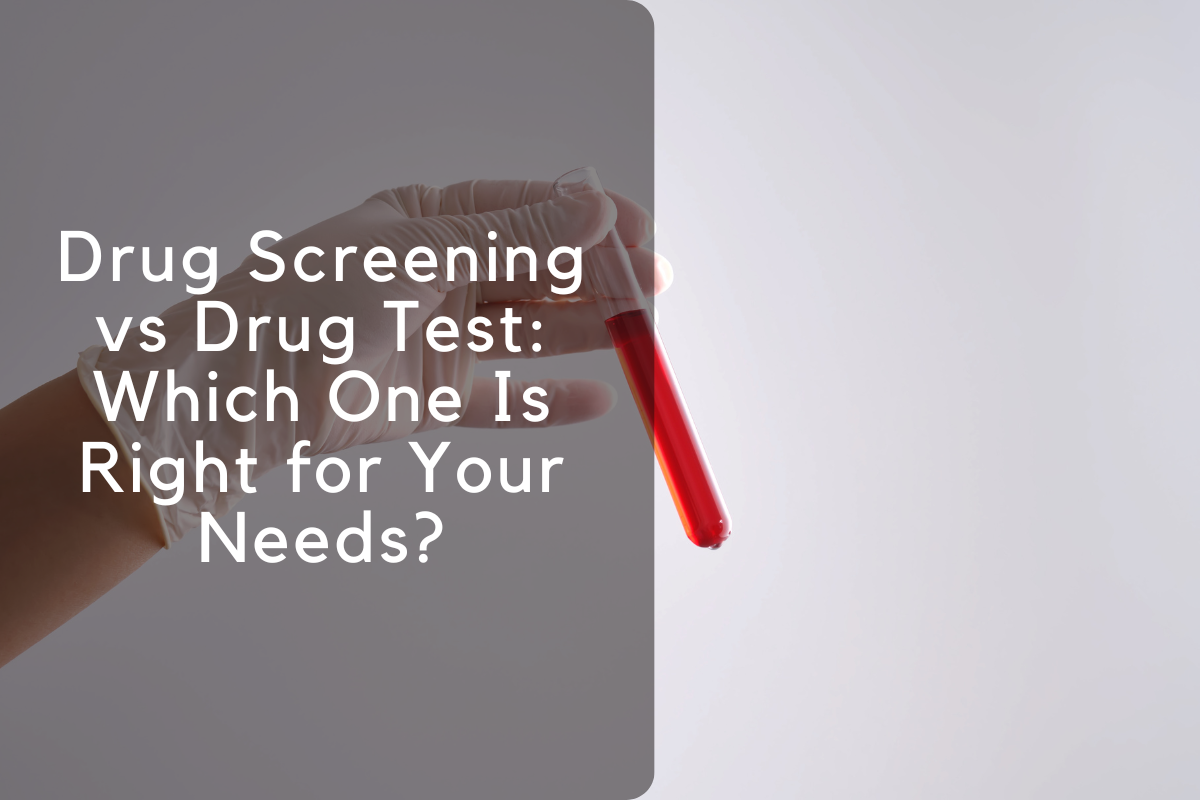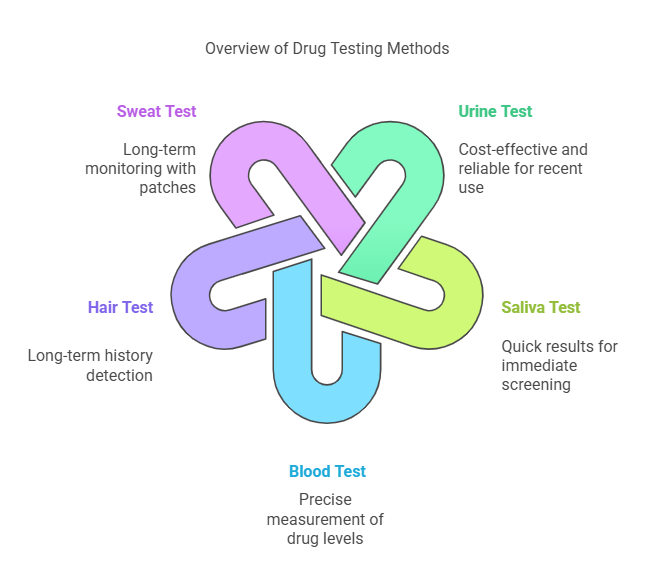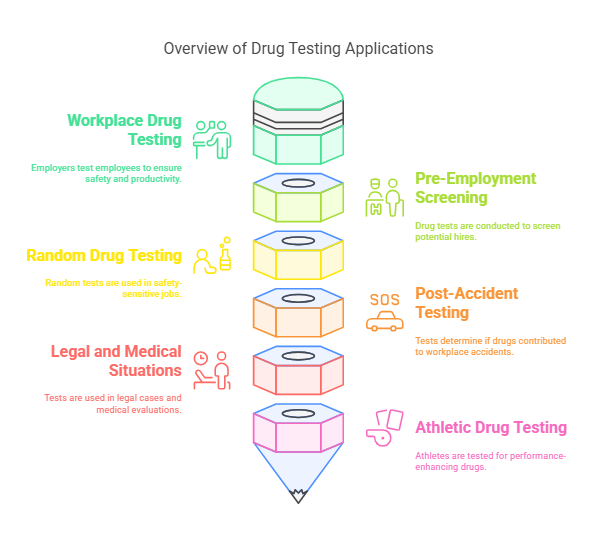Table of Contents
ToggleUnderstanding Drug Screening vs Drug Test

When it comes to evaluating the presence of drugs in an individual’s system, the terms drug screening and drug test are often used interchangeably. However, there are important distinctions between the two. Understanding these differences is crucial for employers, individuals, and healthcare professionals.
What is Drug Screening?
Drug screening refers to the preliminary process of checking for the presence of drugs in a person’s system. Typically, it involves the use of a rapid, non-invasive method designed to identify whether any drugs are present. The goal of screening is to quickly assess if further testing is necessary. Drug screening is often the first step in situations where drug use is suspected.
There are several methods of drug screening, with urine and saliva tests being the most common. Drug screening is generally faster and less expensive compared to a full drug test.
What is a Drug Test?
A drug test is a more detailed and confirmatory analysis conducted to identify specific substances in the body. Drug testing is typically used after a screening test produces a positive result, to ensure accuracy and specificity. Tests may also be used in instances where a more comprehensive assessment is needed, such as in legal or medical cases.
Drug tests are more in-depth and typically involve the analysis of blood, hair, or urine samples, depending on the substances being tested for and the accuracy required. The testing process is more complex and usually provides more reliable results compared to drug screening.
Types of Drug Tests and Their Uses

There are several types of drug tests used in both screening and diagnostic situations. Here are the most common ones:
1. Urine Drug Test
Urine tests are the most commonly used method for both drug screening and testing. They are cost-effective, non-invasive, and provide reliable results for detecting recent drug use. A urine test can detect drugs such as marijuana, cocaine, opiates, and amphetamines. It is widely used in workplace drug testing and legal situations.
2. Saliva Drug Test
Saliva tests are another popular method of drug screening. They are often used in situations where immediate results are required, as saliva tests provide quicker results than urine tests. These tests are typically used to detect recent drug use, and they are non-invasive and easy to administer.
3. Blood Drug Test
Blood tests are typically reserved for more specific and precise testing, such as in medical or legal circumstances. Blood tests are more expensive and invasive but are highly accurate for detecting the presence of drugs and their exact concentration levels. They are commonly used in cases of suspected driving under the influence (DUI) or workplace accidents.
4. Hair Drug Test
Hair tests are commonly used for drug testing in situations where long-term drug use history is important to determine. Hair tests can detect drugs that have been used in the past 90 days, offering a more extended detection window compared to urine or saliva tests. They are highly accurate and are often used for pre-employment screening and legal cases.
5. Sweat Drug Test
This test is less common but is sometimes used for long-term monitoring. Sweat tests involve wearing a patch that collects sweat over a period of time to detect drug usage. The patch is worn for a few days, and it provides a sample for laboratory analysis.
When and Why Drug Screening and Testing Are Used
Both drug screening and drug testing serve important roles in a variety of contexts. In this section, we’ll discuss the primary industries and situations where these practices are required, as well as the importance of each method.
Common Situations and Industries That Use Drug Screening and Testing

1. Workplace Drug Testing
Employers often require drug testing as part of their hiring process, during employment, or following workplace accidents. Drug screening is typically performed as the first step to identify possible drug use, while more detailed drug tests may follow if a screening yields a positive result.
Industries such as construction, transportation, healthcare, and law enforcement frequently require drug testing due to safety concerns. Employers are responsible for maintaining a safe work environment, and drug use can compromise safety and productivity.
2. Pre-Employment Screening
Many employers conduct drug tests as part of their pre-employment screening process to ensure that new hires are not using illegal drugs. This helps ensure a safe and productive work environment from the start. Drug screening in the pre-employment process helps eliminate candidates who may pose a risk due to drug use.
3. Random Drug Testing in Certain Professions
In some industries, random drug testing is a routine part of employment. This is particularly common in industries that involve safety-sensitive jobs, such as transportation, construction, and airline industries. Employers use random drug testing to ensure employees remain drug-free throughout their employment.
4. Post-Accident Drug Testing
Drug testing is often required after a workplace accident to determine whether drugs or alcohol contributed to the incident. This is crucial for workplace safety regulations and insurance purposes. In such situations, both drug screening and confirmatory drug tests may be performed to ascertain the cause of the accident.
5. Legal and Medical Situations
In legal or medical situations, drug testing is often used to determine whether an individual was under the influence of drugs or alcohol at a specific time. For example, drug testing may be used in DUI cases, child custody cases, or in probation scenarios. Rapid Hire Solutions offers specialized drug testing services for businesses and individuals, ensuring compliance with regulations and helping to avoid legal complications.
6. Athletic Drug Testing
Athletes in competitive sports undergo drug testing to ensure they are not using performance-enhancing drugs (PEDs) or other banned substances. Organizations like the World Anti-Doping Agency (WADA) require drug testing to uphold fairness and integrity in sports.
Importance of Drug Screening and Testing in the Workplace
Both drug screening and drug testing play vital roles in maintaining a safe and efficient workplace. These tests help:
- Promote safety by reducing the likelihood of accidents caused by impaired workers
- Ensure productivity by preventing employees from being under the influence of drugs during working hours
- Reduce liability by protecting employers from accidents or legal consequences that could arise due to drug use on the job
- Promote a healthy work environment by discouraging drug use and creating a culture of accountability
How Drug Screening and Testing Are Conducted
Drug screening and testing are typically conducted by certified professionals or third-party agencies. The process often involves:
- Collection of samples (urine, saliva, hair, blood, etc.)
- Initial screening using rapid tests or point-of-care testing methods
- Confirmatory testing if the initial screening yields a positive result, often using laboratory-based methods for accuracy
How Rapid Hire Solutions Can Help
At Rapid Hire Solutions, we provide businesses and individuals with efficient and reliable drug screening and testing services. Our streamlined process ensures compliance with industry regulations and allows employers to quickly identify and address potential risks. Whether you need pre-employment testing, random testing, or post-accident screening, we offer customized solutions to fit your needs.
Legal Aspects, FAQs, and Conclusion
Legal Aspects of Drug Screening and Testing
Understanding the legal framework around drug screening and testing is essential to ensure compliance with laws and regulations. These legal guidelines govern how and when drug tests can be conducted, protecting both employees and employers.
1. Federal Regulations
At the federal level, drug testing is regulated by agencies like the U.S. Department of Transportation (DOT) and Substance Abuse and Mental Health Services Administration (SAMHSA). These agencies have strict guidelines for drug testing in industries like transportation, aviation, and healthcare.
2. State Laws
In addition to federal regulations, each state may have its own laws regarding drug testing. Some states have laws prohibiting discrimination against employees who fail a drug test, while others may require employers to offer counseling or rehabilitation for individuals who test positive.
3. Privacy and Consent
Employers must obtain written consent from employees or job candidates before conducting drug tests. In addition, testing must be done in a way that respects the individual’s privacy and ensures accurate results.
Frequently Asked Questions (FAQs)
What is the difference between drug screening and drug testing?
Drug screening is a preliminary method to quickly detect the presence of drugs, whereas drug testing is a more detailed and confirmatory process that provides accurate results.
Can drug screening results be used in court?
Drug screening results are typically not admissible in court due to their preliminary nature. Confirmatory drug tests, however, can be used as evidence.
How long do drugs stay in your system for a drug test?
The detection window varies depending on the drug used and the test method. For example, marijuana may stay in the system for up to 30 days, while cocaine may only be detectable for a few days.
Are drug tests accurate?
Yes, drug tests are highly accurate, especially when confirmatory testing (such as gas chromatography-mass spectrometry) is used to validate results.
Can I refuse a drug test at work?
If drug testing is a condition of employment or required by law, refusing a drug test may result in disciplinary action or loss of employment.
Conclusion
What is the difference between drug screening and drug testing?
Drug screening is a preliminary method to quickly detect the presence of drugs, whereas drug testing is a more detailed and confirmatory process that provides accurate results.
Can drug screening results be used in court?
Drug screening results are typically not admissible in court due to their preliminary nature. Confirmatory drug tests, however, can be used as evidence.
How long do drugs stay in your system for a drug test?
The detection window varies depending on the drug used and the test method. For example, marijuana may stay in the system for up to 30 days, while cocaine may only be detectable for a few days.
Are drug tests accurate?
Yes, drug tests are highly accurate, especially when confirmatory testing (such as gas chromatography-mass spectrometry) is used to validate results.
Can I refuse a drug test at work?
If drug testing is a condition of employment or required by law, refusing a drug test may result in disciplinary action or loss of employment.
Both drug screening and drug testing are essential tools in maintaining safety, productivity, and compliance in various industries. By understanding the differences between screening and testing, their uses, and the legal framework, employers and employees can ensure that drug testing procedures are followed appropriately. Rapid Hire Solutions is here to support businesses and individuals in navigating the drug screening and testing process, offering customized services tailored to your needs.
